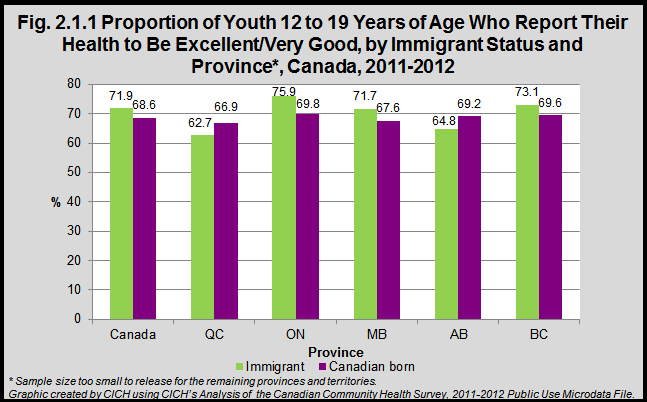Proportion of Youth, 12-19, Who Reported Their Health to Be Excellent/Very Good, 2011-2012

Almost three-quarters (72%) of immigrant youth aged 12 to 19 years report that their health is excellent or very good. This is slightly higher than their Canadian born counterparts. Young men who are immigrants are more likely than are young women to say that this is the case – 75% compared with 68% respectively.
In Québec and Alberta immigrant youth are slightly less likely than their Canadian born counterparts to report that their health is excellent or very good.
In this data, the term ‘immigrant’ groups all types of immigrants together. However, refugee children’s health is often not as good as that of other immigrants.1This is likely due in part to refugees receiving insufficient health care and living in substandard conditions in their countries of origin and having greater difficulty meeting their basic needs upon their arrival in Canada due to financial reasons.
1DesMeules, M., Gold, J., Kazanjian, A., Manuel, D., Payne, J., Vissandjée, B., McDermott, S., & Mao, Y. (2004). New Approaches to Immigrant Health Assessment. Canadian Journal of Public Health, 95 (3). I-22 – I-26.
Implications
Immigrant children and youth and their families come from a wide variety of cultural and linguistic backgrounds. Upon arrival, new immigrants tend to be healthier than the Canadian-born population, both because of immigrant-selection processes and because of certain socio-cultural aspects of health behaviours. However, refugees are more vulnerable and not able to enjoy the same measure of good health at the time of arrival. However, at least for adults, there is a decline in this “healthy immigrant effect” soon after arrival.
